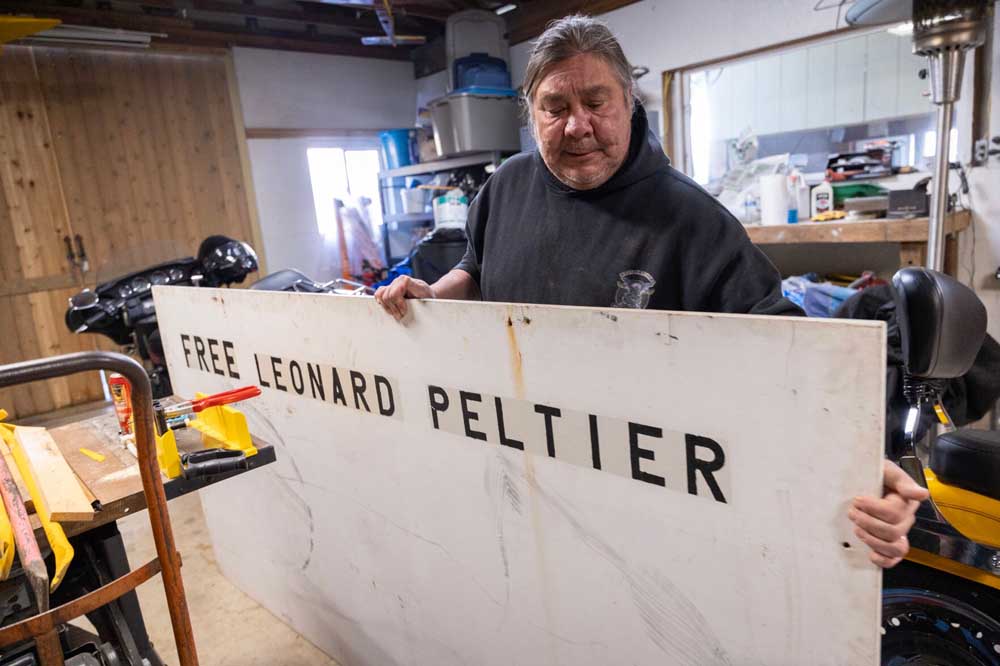Native American activist Leonard Peltier leaves prison after nearly 50 years
Published 4:00 am Wednesday, February 19, 2025

- Chauncey Peltier, the son of Native American activist Leonard Peltier, has fought for his father's freedom for decades. On Tuesday, Feb. 18, Leonard Peltier left a Florida prison to serve the rest of his life sentence at home.
After spending nearly five decades behind bars, Native American activist Leonard Peltier was released Tuesday, Feb. 18, from a Florida prison to serve the remainder of his life sentence in home confinement, per the Associated Press.
Trending
Peltier, 80, lived in Washington County for years before his 1977 conviction for the killings of two FBI agents — a case long contested as emblematic of the systemic injustice perpetrated against Native Americans.
As recently as July 2024, Peltier was denied parole and was not eligible for reconsideration until 2026. But in his final days in office, former President Joe Biden commuted his sentence, citing Peltier’s poor health and how the activist has spent most of his life in prison.
According to the Associated Press, Peltier — a member of the Turtle Mountain Band of Chippewa Indians — left Coleman Federal Penitentiary in an SUV bound for North Dakota, where he will celebrate with friends and family and finish out his sentence in a home arranged by his tribe.
Trending
A controversial conviction
Peltier was a prominent activist in the American Indian Movement — a group formed to combat police brutality and discrimination against Native Americans.
In 1973, the movement gained national attention when it occupied Wounded Knee on the Pine Ridge Reservation in South Dakota, leading to a 71-day standoff with federal law enforcement and residual political violence that engulfed the reservation for years.
Three years later, at the height of the tension, FBI agents Ron Williams and Jack Coler followed a vehicle carrying Peltier and others before a firefight erupted, leaving both agents wounded before being shot in the head at close range. Joseph Stuntz, a member of the American Indian Movement, was also killed during the gunfire.
Two of Leonard Peltier’s codefendants, Darrelle “Dino” Butler and Bob Robideau, were acquitted on self-defense claims. But Peltier, who had fled to Canada, was extradited and convicted of two counts of first-degree murder and sentenced to two consecutive terms of life imprisonment.
Over the years, Peltier has maintained his innocence, and critics have challenged key aspects of his conviction. A witness who claimed to have seen Peltier shoot the agents later recanted, saying her testimony had been coerced. Appeals state that documents withheld during the trial, including a ballistics report, suggested the fatal bullets did not come from Peltier’s weapon.
Even with concerns, law enforcement officials have remained steadfast in defending the conviction — with former FBI Director Christopher Wray voicing Peltier’s sentence earlier this year, noting the 22 federal judges who rejected his legal appeals.
A long-awaited homecoming
For Peltier’s supporters, his release marks the end of a decades-long fight, including for his son, Chauncey Peltier, who was just 10 years old when his father was imprisoned.
Chauncey Peltier, who was born in Hillsboro and grew up in Banks, carried the weight of his father’s absence — and the name that made him a target for harassment.
After years of courtroom battles and public rallies, he is preparing for a reunion that has been a lifetime in the making.
“I prayed every day that he’d get released, but I didn’t ever think he would because of the FBI,” he said.
Chauncey Peltier plans to head out to North Dakota once the dust settles, he told the News-Times, planning to visit his father in March.
“I’m sure it’s going to be chaos for him. It’s all over Facebook,” Chauncey Peltier said. “People are wanting to go see him and camp out there. It’s just the beginning of the weirdness.”







